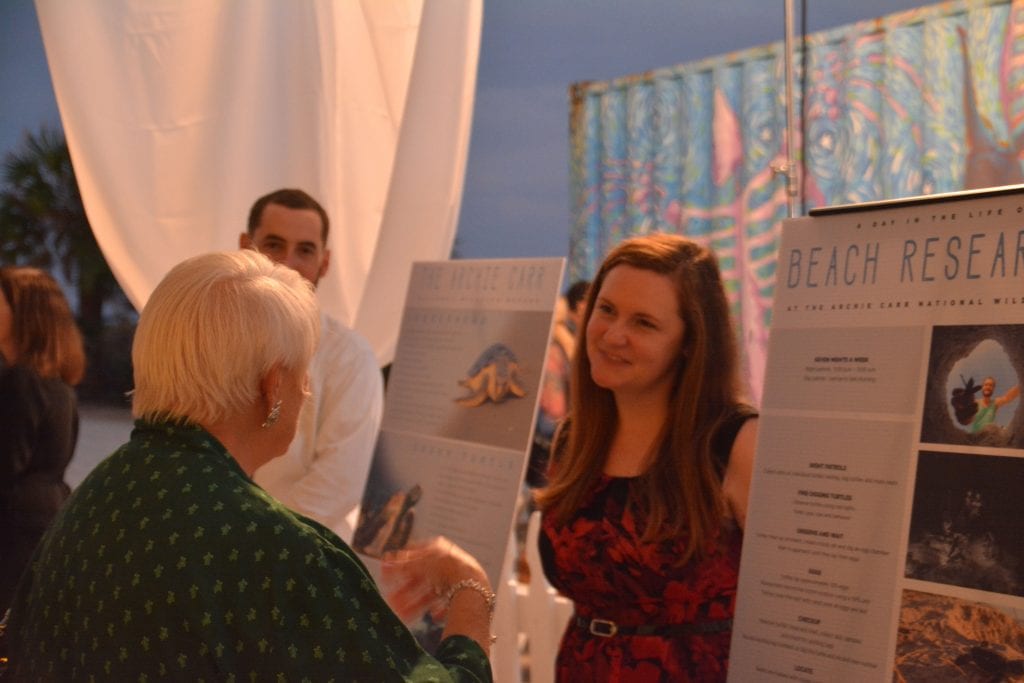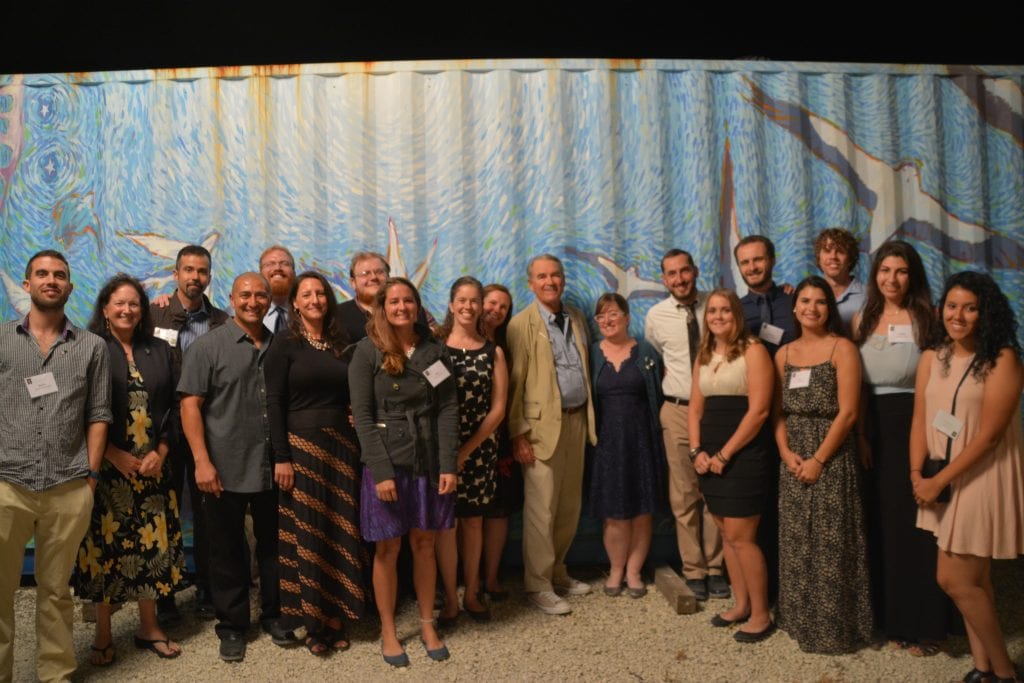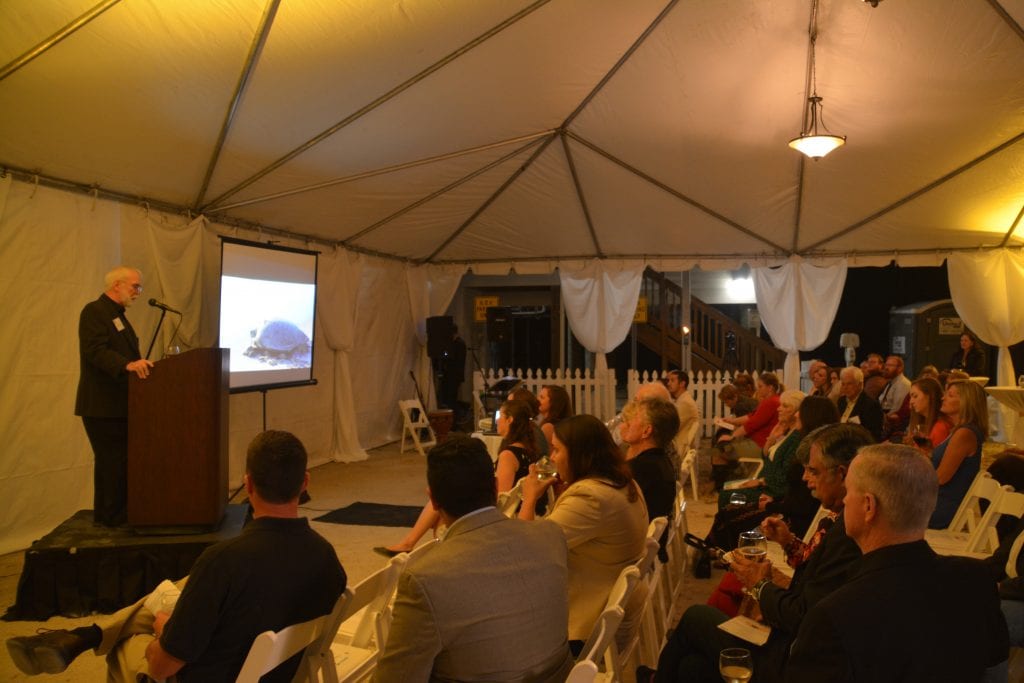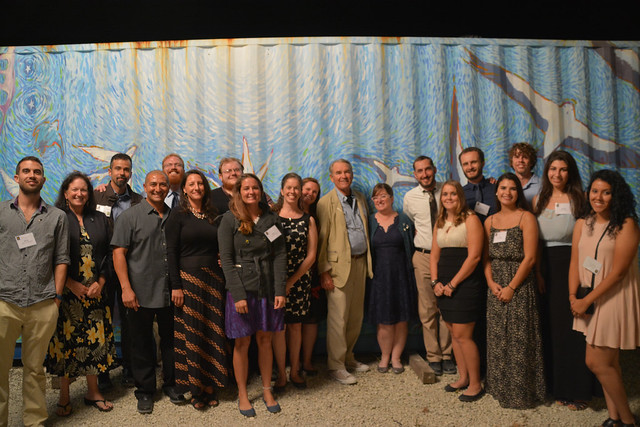A Knight for the Sea Turtles
The University of Central Florida College of Sciences and Department of Biology hosted ‘A Knight for the Sea Turtles’ in Melbourne Beach on Friday, November 18, 2016. The event celebrated UCF’s partnership with the U.S. Fish and Wildlife Service.
The partnership, announced over the summer, establishes a permanent conservation research facility along the southern Brevard County coastline. It gives the university more control and responsibility for the existing property onsite, establishes a protocol that will allow UCF to build research facilities and a plan that will give UCF oversight of the facilities for 40 years or more.
More than 60 guests gathered at the site in Melbourne Beach to celebrate the partnership. Dean of the UCF College of Sciences Michael Johnson, Ph.D., welcomed guests to the event, and recognized special guest Lew Ehrhart, Ph.D., UCF biology professor emeritus and Pegasus Professor.
“Dr. Ehrhart brought sea turtle nesting surveying to the Canaveral National Seashore in the early 1970’s, then took his research further south in the 1980’s to formally establish the UCF Marine Turtle Research Project in Melbourne Beach,” Dean Johnson said. “He then helped establish the Archie Carr National Wildlife Refuge in 1991 and began what has become one of the longest continuous data set in sea turtle research in the world.”
Bill Miller, project leader for the Everglades Headwaters National Wildlife Refuge Complex, spoke following Dean Johnson at the event. He described the U.S. Fish and Wildlife Service’s role at the Archie Carr National Wildlife Refuge and beyond.
UCF Biology Assistant Professor and Lab Director of the UCF Marine Turtle Research Group Kate Mansfield, Ph.D., then spoke. She highlighted the research and goals of the Marine Turtle Research Group and how she hopes to see the facility (including the Caretta House) expand to support much-needed equipment storage and protection, a full-service wet lab, a classroom, and space to encourage working groups, training, and collaboration.
“This partnership creates a foundation from which we hope to foster new research, hands-on education, and provide scientific advisory service to the local community and state and federal management agencies,” said Mansfield.
The UCF Marine Turtle Research Group has been studying all aspects of marine turtle biology since 1982. Data from this program helped to create the Archie Carr National Wildlife Refuge and contributes to the conservation of threatened and endangered marine turtles.
The location in southern Brevard County hosts the largest nesting of loggerheads in the Western Hemisphere, the densest green turtle nesting in the United States and a growing population of nesting leatherback sea turtles.
In addition to its work with nesting females, the UCF Marine Turtle Research Group conducts studies of juvenile turtles in two coastal sites in central Florida, and offshore in the Gulf of Mexico. These sites can host turtles that hatched on beaches as far away as Costa Rica and South America.
The UCF biology graduate students conducting this research attended the event, presenting their work and discussing program efforts with guests.

UCF biology graduate students speak to guests about their research on site.
The UCF Marine Turtle Research Group moved to its current location, the Caretta House two years ago. Prior to that, the group was located at what is affectionately known as the “beach house” from 2005- early 2015. The U.S. Fish and Wildlife Service generously allowed the group to use the older facility after UCF’s previous facility was destroyed during a hurricane.
Currently, the Caretta House is the base of operations for studying the nesting ecology of three species of marine turtle: the loggerhead, green and leatherback turtles.
“Partnerships like the one existing between UCF and U.S. Fish and Wildlife Service are critical to coastal research endeavors in Florida,” Dean Johnson said. “Our vision is to build on the long-term legacy of the UCF Marine Turtle Research Group and create a center for whole-life history research.”
This center would provide an opportunity to leverage the “living laboratory” of the Archie Carr National Wildlife Refuge and offshore and coastal field sites to provide conservation and research training to students and international researchers.
“State funding is not going to pay for the Caretta House’s expansion,” Dean Johnson said in closing. “Philanthropy is the key to bringing UCF to the forefront of sea turtle research.”
Those interested in supporting the UCF Marine Sea Turtle Research Group can donate here.



